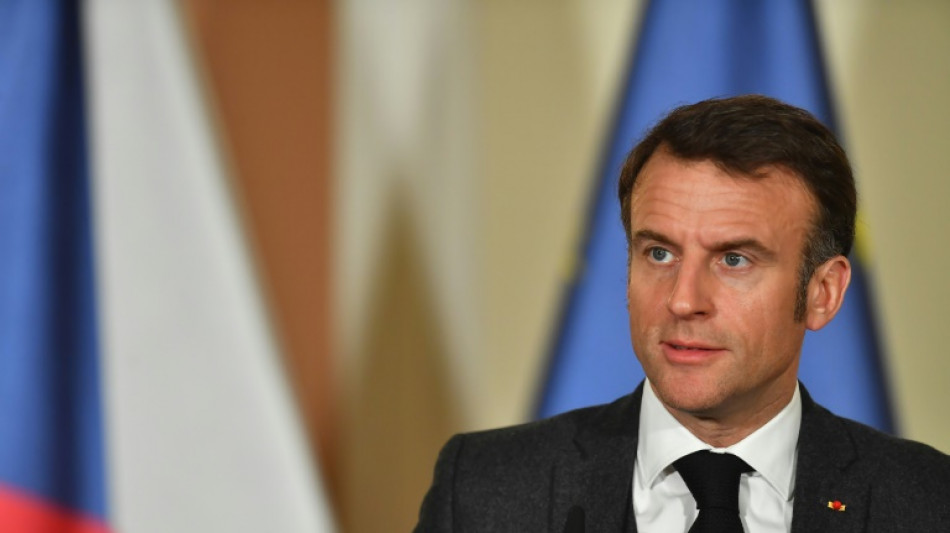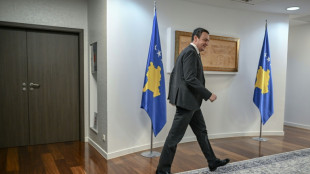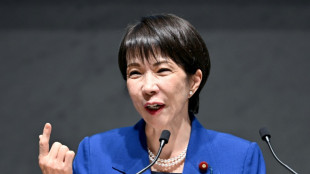
-
 Man Utd made to 'suffer' for Newcastle win, says Amorim
Man Utd made to 'suffer' for Newcastle win, says Amorim
-
Morocco made to wait for Cup of Nations knockout place after Egypt advance

-
 Key NFL week has playoff spots, byes and seeds at stake
Key NFL week has playoff spots, byes and seeds at stake
-
Morocco forced to wait for AFCON knockout place after Mali draw

-
 Dorgu delivers winner for depleted Man Utd against Newcastle
Dorgu delivers winner for depleted Man Utd against Newcastle
-
US stocks edge lower from records as precious metals surge

-
 Somalia denounces Israeli recognition of Somaliland
Somalia denounces Israeli recognition of Somaliland
-
The Cure guitarist and keyboard player Perry Bamonte dies aged 65

-
 Draper to miss Australian Open
Draper to miss Australian Open
-
Police arrest suspect after man stabs 3 women in Paris metro

-
 Former Montpellier coach Gasset dies at 72
Former Montpellier coach Gasset dies at 72
-
Trump's Christmas gospel: bombs, blessings and blame

-
 Russia lashes out at Zelensky ahead of new Trump meeting on Ukraine plan
Russia lashes out at Zelensky ahead of new Trump meeting on Ukraine plan
-
Salah helps Egypt beat South Africa and book last-16 place

-
 Australia's Ikitau facing lengthy lay-off after shoulder injury
Australia's Ikitau facing lengthy lay-off after shoulder injury
-
Another 1,100 refugees cross into Mauritania from Mali: UN

-
 Guardiola proud of Man City players' response to weighty issues
Guardiola proud of Man City players' response to weighty issues
-
Deadly blast hits mosque in Alawite area of Syria's Homs

-
 The Jukebox Man on song as Redknapp records 'dream' King George win
The Jukebox Man on song as Redknapp records 'dream' King George win
-
Liverpool boss Slot says Ekitike reaping rewards for greater physicality

-
 Judge jails ex-Malaysian PM Najib for 15 more years after new graft conviction
Judge jails ex-Malaysian PM Najib for 15 more years after new graft conviction
-
Musona rescues Zimbabwe in AFCON draw with Angola

-
 Zelensky to meet Trump in Florida on Sunday
Zelensky to meet Trump in Florida on Sunday
-
'Personality' the key for Celtic boss Nancy when it comes to new signings

-
 Arteta eager to avoid repeat of Rice red card against Brighton
Arteta eager to avoid repeat of Rice red card against Brighton
-
Nigeria signals more strikes likely in 'joint' US operations

-
 Malaysia's former PM Najib convicted in 1MDB graft trial
Malaysia's former PM Najib convicted in 1MDB graft trial
-
Elusive wild cat feared extinct rediscovered in Thailand

-
 Japan govt approves record budget, including for defence
Japan govt approves record budget, including for defence
-
Seoul to ease access to North Korean newspaper

-
 History-maker Tongue wants more of the same from England attack
History-maker Tongue wants more of the same from England attack
-
Australia lead England by 46 after 20 wickets fall on crazy day at MCG

-
 Asia markets edge up as precious metals surge
Asia markets edge up as precious metals surge
-
Twenty wickets fall on day one as Australia gain edge in 4th Ashes Test

-
 'No winner': Kosovo snap poll unlikely to end damaging deadlock
'No winner': Kosovo snap poll unlikely to end damaging deadlock
-
Culture being strangled by Kosovo's political crisis

-
 Main contenders in Kosovo's snap election
Main contenders in Kosovo's snap election
-
Australia all out for 152 as England take charge of 4th Ashes Test

-
 Boys recount 'torment' at hands of armed rebels in DR Congo
Boys recount 'torment' at hands of armed rebels in DR Congo
-
Inside Chernobyl, Ukraine scrambles to repair radiation shield

-
 Bondi victims honoured as Sydney-Hobart race sets sail
Bondi victims honoured as Sydney-Hobart race sets sail
-
North Korea's Kim orders factories to make more missiles in 2026

-
 Palladino's Atalanta on the up as Serie A leaders Inter visit
Palladino's Atalanta on the up as Serie A leaders Inter visit
-
Hooked on the claw: how crane games conquered Japan's arcades

-
 Shanghai's elderly waltz back to the past at lunchtime dance halls
Shanghai's elderly waltz back to the past at lunchtime dance halls
-
Japan govt approves record 122 trillion yen budget

-
 US launches Christmas Day strikes on IS targets in Nigeria
US launches Christmas Day strikes on IS targets in Nigeria
-
Australia reeling on 72-4 at lunch as England strike in 4th Ashes Test

-
 Too hot to handle? Searing heat looming over 2026 World Cup
Too hot to handle? Searing heat looming over 2026 World Cup
-
Packers clinch NFL playoff spot as Lions lose to Vikings


Macron assisted-dying plan riles opponents
President Emmanuel Macron on Monday faced criticism from French medical workers, political opponents and the Catholic Church over a draft bill, slated for debate in May, that would allow assisted dying for certain terminally-ill patients.
He told newspapers Sunday the bill would include "strict conditions" on allowing people to self-administer a lethal substance, or call on a relative or medical worker if they are incapable.
The move comes after France's parliament last week enshrined the right to abortion in the constitution, a widely-popular move championed by the president and a world first.
"There are cases we can't humanly accept," Macron told Catholic newspaper La Croix and left-wing Liberation, saying the "brotherly" law "looks death in the face".
Prime Minister Gabriel Attal wrote on X that the bill would be presented to the French parliament from May 27. "Death can no longer be a taboo issue and subject to silence," he added.
But several health workers' groups declared their "consternation, anger and sadness" at the plan.
Macron "has with great violence announced a system far removed from patients' needs and health workers' daily reality, which could have grave consequences on the care relationship," the associations for palliative care, cancer support and specialist nurses said in a joint statement.
Accusing the government of aiming to save money with the plan, they said that greater resources for palliative care, rather than assisted dying, would fulfil patients' demands to "die with dignity".
Political opponents accused Macron of hijacking the abortion and assisted dying debates as a diversion in his party's campaign for June 9 European Parliament elections.
"Purchasing power, security and immigration are the concerns of the French public," said Laurent Jacobelli, spokesman for the far-right National Rally (RN) currently leading the polls.
- Campaign promise -
The bill is unlikely to become law before 2025 after two readings in each of parliament's two houses.
At present, French law allows for "deep and continuous sedation" of patients who would otherwise endure great suffering and with a short life expectancy.
But updating the rules was one of Macron's presidential campaign promises, and he gathered an assembly of randomly-selected citizens to deliberate.
They issued a non-binding decision in 2023 that assisted dying should be allowed under certain conditions.
The draft law he has now proposed would open assisted dying to adults "fully capable of discernment" -- ruling out psychiatric and Alzheimer's patients, for example.
They would have to be suffering from an "incurable" condition likely to be fatal in the "short or medium term", causing suffering that is "resistant to treatment".
Patients' request for assisted dying would be ruled on by their medical team within two weeks. If approved, they would get a prescription for a lethal substance that could be self-administered.
People suffering from certain conditions, such as motor neurone disease, would be able to nominate someone to administer the lethal dose or get help from a health worker.
Beyond assisted dying, the law would also pump a billion euros ($1.1 billion) into palliative care over 10 years, Macron told the newspapers, also vowing to open 21 new centres in under-served areas.
- 'Towards death' -
"France is finally emerging from the dilly-dallying of the last few months," the Association for the Right to Die in Dignity (ADMD) said in a statement.
The group hailed the "relatively precise timetable" for the law to come before parliament.
But ADMD also objected to some provisions, such as the choice to rule out requests in advance from Alzheimer's sufferers.
"I hope (the law) will allow us to find what we wish for when we're close to the end, which is calm," assisted dying campaigner Loic Resibois, who suffers from motor neurone disease, told broadcaster France Inter.
"Knowing that French law will finally allow us to avoid a situation where we're not yet dead, but not really alive any more, is very important," he added.
Meanwhile France's Catholic bishops categorically rejected the bill.
"A law like this, whatever its aim, will bend our whole health system towards death as a solution," bishops' conference chief Eric de Moulins-Beaufort told La Croix.
"What helps people die in a fully human way is not a lethal drug, it's affection, esteem and attention," he added.
P.Costa--AMWN



